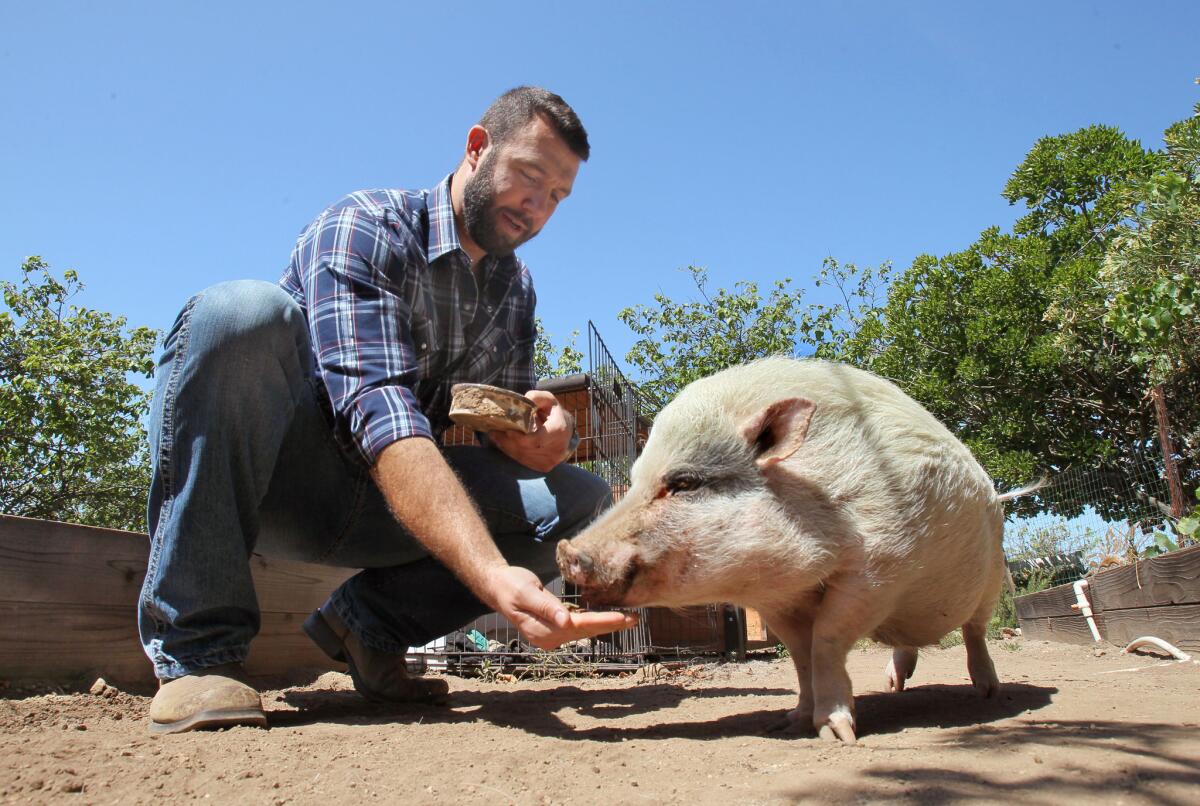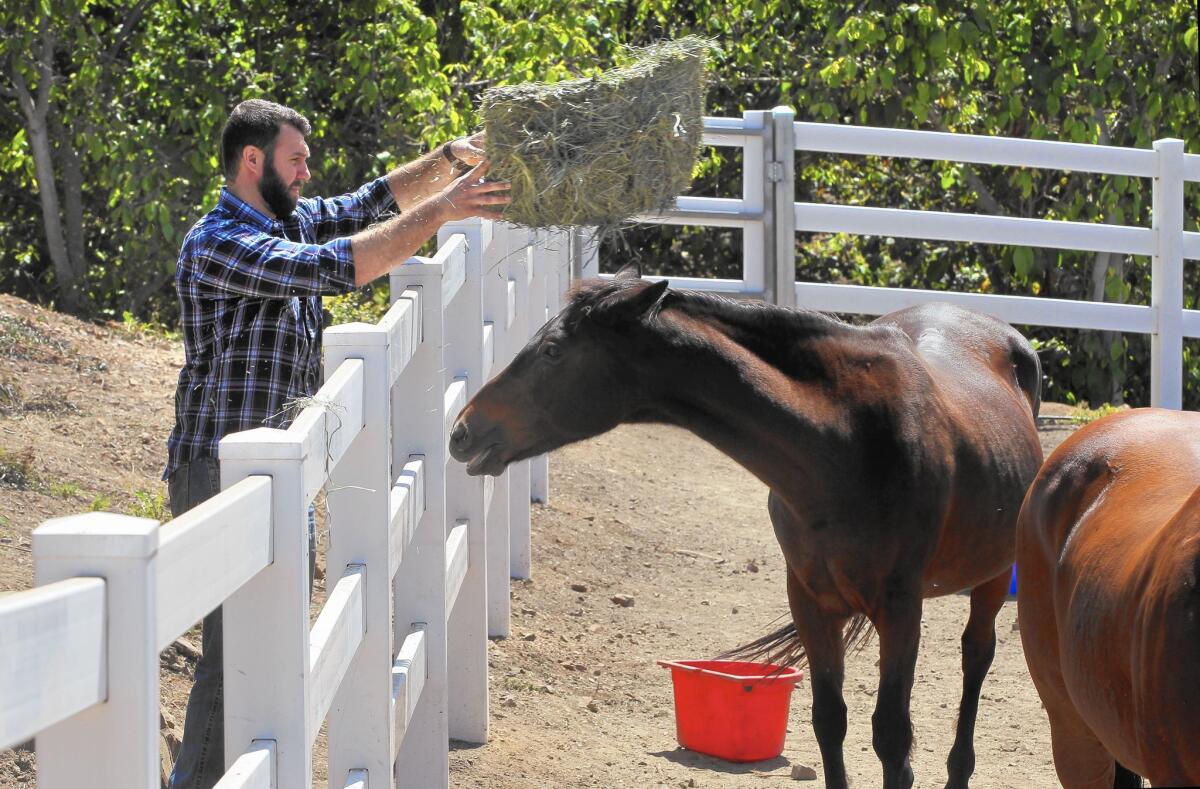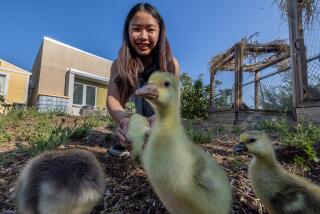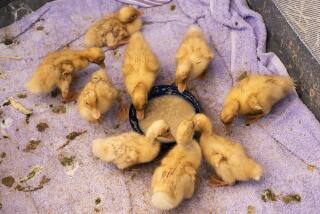Lawyer follows his vegetarian convictions by opening an animal rescue farm

John Fiske, an environmental lawyer and owner of San Diego Farm Animal Rescue, feeds Roosevelt, a pot-bellied pig born with deformed hooves.
- Share via
Until just over a year ago, John Fiske believed he was doing right by the planet by eating only grass-fed beef.
Then, in what he calls a “lightbulb moment,” the attorney, 32, decided animal agriculture came at too high a cost. Now he is putting his money where his heart is.
Over the last year, Fiske, now a vegetarian, has transformed his 2.5-acre Elfin Forest “ranchita” into a sanctuary for rescued animals. So far, it is home to four horses, a crippled pig, two hens and a German shepherd. A few goats will be arriving soon. On Sunday, Fiske will host the grand opening of his San Diego Farm Animal Rescue.
See more of our top stories on Facebook >>
Through the organization’s Facebook page and website, he said, he hopes to raise awareness, find new homes for slaughter-bound animals and gradually build a network of ranchers and farmers with the same humanitarian purpose.
“My goal is to promote the concept of compassion,” Fiske said. “Now that I’m on the other side with the personal journey I’ve taken, I can show how important it is for a person’s ideas to evolve.”

John Fiske tosses hay over the fence of the pen to feed his horses.
Fiske grew up in Rancho Penasquitos in northeastern San Diego, where he was raised to love the outdoors. He and his father camped all over Southern California, and he studied environmental science in high school and college.
When he finished law school, he dreamed of becoming a district attorney. But three years ago, an opportunity came along to develop a new “eco-lawyer” division at a personal injury law firm in downtown San Diego. Fiske now represents, among other clients, numerous California cities that are suing the chemical-maker Monsanto over the cost of cleaning up polychlorinated biphenyls, or PCBs, in public waterways.
Although he’s a longtime environmentalist, he said his interest in saving animals wasn’t awakened until he started dating a dedicated vegetarian. During the two years they were together, she often talked about her dream of creating a sanctuary for farm animals.
He bought the ranch a year ago and has spent every weekend working on it. When he and the woman split up, he held onto her vision.
Fiske said he also was moved by a documentary, “Cowspiracy: The Sustainability Secret,” which explains how raising beef cattle and pigs affects global water consumption, water pollution, rainforest destruction, climate change, land use, world hunger and wildlife extinction.
The ways people view different types of animals no longer makes sense to him.
“Our society has drawn a line between eating cows and pigs and eating dogs and cats, but there’s no real reason for it. The number of farm animals killed each year is astronomically high,” he said.
According to the Humane Society of the United States, 2.7 million dogs and cats were euthanized in shelters across the nation last year. Meanwhile, 9.2 billion farm animals — cattle, chickens, turkeys, ducks, hogs, sheep and lambs — were killed in slaughterhouses.
At Fiske’s Rancho Cherimoya, so named for its 120 fruit trees, one of his first rescues — from a local shelter — was Daisy, a 3-year-old German shepherd.
Pokey and Emma, retired trail horses in their late 20s, will live out their days on the ranch. Frisco and Jingo are 15-year-old paint broodmares who were saved from slaughter and are available for adoption as a pair.
Roosevelt is a 4-year-old, pot-bellied pig born with deformed hooves. His owners were moving out of the county and wanted to ensure he went to a good home.
The ranch also is home to Amelia and Eleanor, two rescued Buff Orpington chickens.
To cover the costs of animal feed, Fiske rents out a studio apartment on his property on Airbnb. He also sells his cherimoyas.
He says he knows his property is too small to save many farm animals from slaughter, but he hopes that his message will inspire visitors to think.
“Our food system has become a grotesque, violent industry, and unless we help out those who can’t help themselves, our job isn’t done,” he said.
Kragen writes for the San Diego Union-Tribune.
ALSO
Navy SEAL candidate dies during water training
It’s time to craft workable solutions to homelessness
More to Read
Sign up for Essential California
The most important California stories and recommendations in your inbox every morning.
You may occasionally receive promotional content from the Los Angeles Times.










